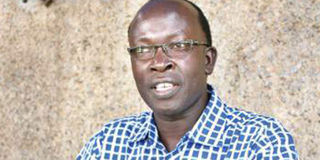Barasa blow in ICC battle against arrest

Journalist Walter Barasa’s fight against a warrant of arrest by the International Criminal Court (ICC) suffered a setback after the High Court ruled that an application to arrest him can go ahead. PHOTO | FILE
What you need to know:
- If Mr Tobiko successfully persuades the judge, Mr Barasa could be on his way to The Hague to face charges of trying to influence a witness who testified against Deputy President William Ruto and journalist Joshua arap Sang
- Mr Justice Mwongo noted that although he had sufficient evidence to decide Mr Barasa’s application, it would be in the interest of justice if the DPP argued the request filed by Interior Cabinet Secretary Joseph Ole Lenku
- Mr Barasa claimed that the president, his deputy and Mr Sang are interested parties in the application to determine Kenya’s continued cooperation with ICC
Journalist Walter Barasa’s fight against a warrant of arrest by the International Criminal Court (ICC) suffered a setback after the High Court ruled that an application to arrest him can go ahead.
Mr Justice Richard Mwongo gave Director of Public Prosecutions Keriako Tobiko the greenlight to formally apply for the arrest and handing over of Mr Barasa to the ICC to face charges of interfering with witnesses.
The judge ruled that he would hear Mr Tobiko’s application ex-parte meaning that the journalist or his lawyer will not have a chance to respond or object to the request for his arrest.
If Mr Tobiko successfully persuades the judge, Mr Barasa could be on his way to The Hague to face charges of trying to influence a witness who testified against Deputy President William Ruto and journalist Joshua arap Sang.
Mr Barasa is seeking to stop his arrest, arguing that he cannot be tried at the ICC or outside the country for offences punishable by the local courts.
Justice Mwongo further directed the DPP to present him with the Interior minister’s request for the arrest of Mr Barasa on January 20 after which he would rule on January 31.
DUE PROCESS
Mr Justice Mwongo noted that although he had sufficient evidence to decide Mr Barasa’s application, it would be in the interest of justice if the DPP argued the request filed by Interior Cabinet Secretary Joseph Ole Lenku.
Mr Lenku filed the request for Mr Barasa’a arrest on October 25 last year soon after ICC Prosecutor Fatou Bensouda alleged that the journalist had attempted to bribe a witness.
The hearing of the minister’s request was, however, put on hold to await the outcome of Mr Barasa’s application.
Mr Justice Mwongo directed Mr Tobiko to present him with the minister’s request for the arrest of Mr Barasa on January 20 after which he would rule on January 31.
Lawyer Kibe Mungai representing the journalist, however, said he would appeal against the judge’s directions, arguing it would be against the rules of natural justice to have the matter heard in his absence.
“This will be a violation of Mr Barasa’s right to fair administrative action,” said Mr Mungai.
NON-COMPLIANCE
According to the journalist, the ICC wanted him for refusing to cooperate with them in implicating Mr Ruto and Mr Sang. He maintained that the arrest warrant was issued through a scheme to coerce and intimidate him to give false testimony against the two.
At the same time, Justice Mwongo directed that another petition by Mr Barasa to challenge Kenya’s continued cooperation with the ICC will be heard on January 28.
“It is clear the petition touches on several issues including the trial of [President Uhuru] Kenyatta and Mr Ruto at the International Criminal Court and which needs to be heard. The file shall therefore be placed before Justice Isaac Lenaola for further directions,” said Justice Mwongo.
Mr Barasa claimed that the president, his deputy and Mr Sang are interested parties in the application to determine Kenya’s continued cooperation with ICC.





